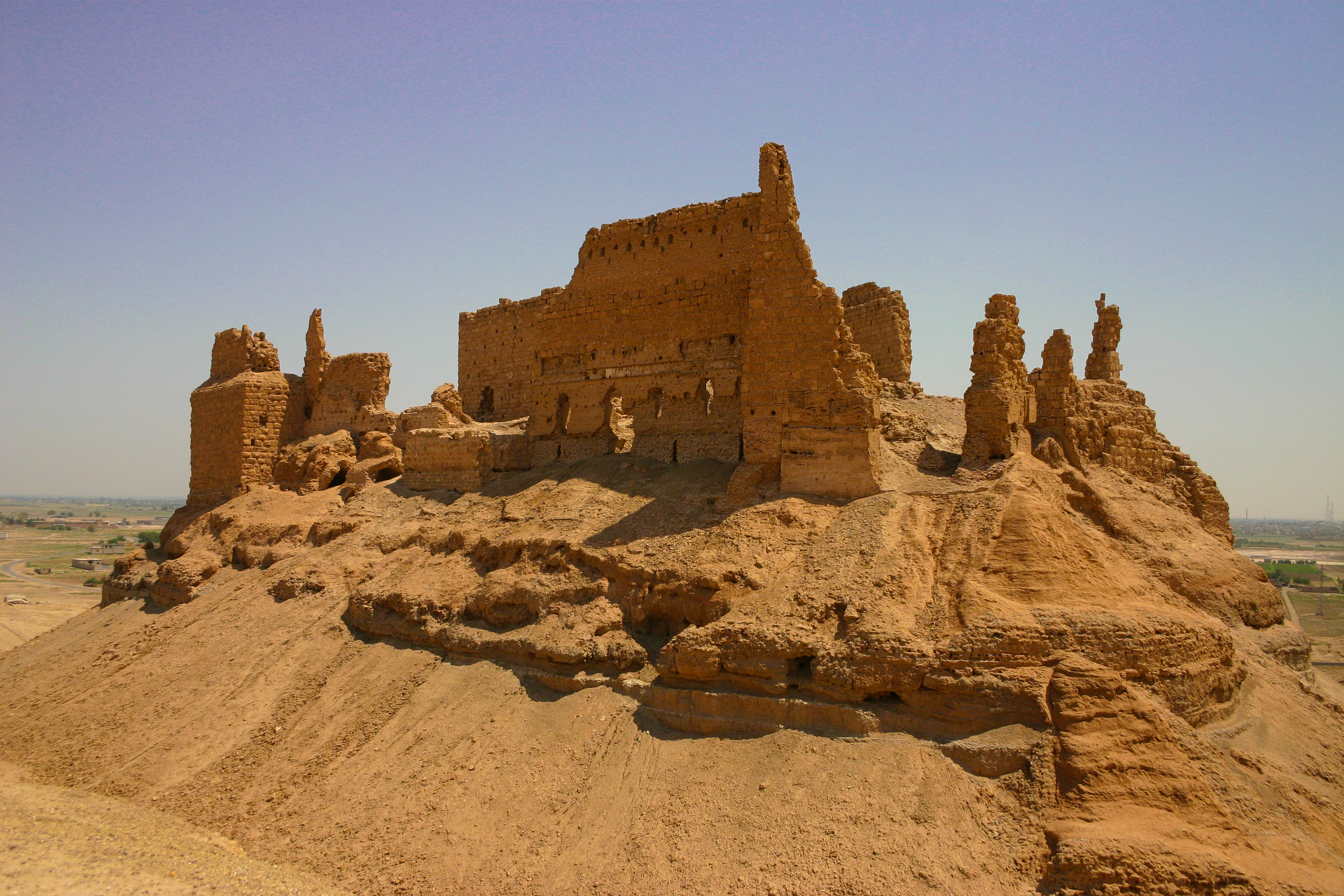Malik Ibn Tauk on:
[Wikipedia]
[Google]
[Amazon]
Malik ibn Tawk ibn Malik ibn 'Attab at-Taghlibi () (died 873) was an Arab
 The
The
Abbasid
The Abbasid Caliphate ( or ; ar, الْخِلَافَةُ الْعَبَّاسِيَّة, ') was the third caliphate to succeed the Islamic prophet Muhammad. It was founded by a dynasty descended from Muhammad's uncle, Abbas ibn Abdul-Muttalib ...
official during the reigns of caliphs al-Wathiq (r. 842–847) and al-Mutawakkil
Abū al-Faḍl Jaʿfar ibn Muḥammad al-Muʿtaṣim bi-ʾllāh ( ar, جعفر بن محمد المعتصم بالله; March 822 – 11 December 861), better known by his regnal name Al-Mutawakkil ʿalā Allāh (, "He who relies on God") was t ...
(r. 847–861). He is best known as the founder of the fortress town of al-Rahba
Al-Rahba (/ALA-LC: ''al-Raḥba'', sometimes spelled ''Raḥabah''), also known as Qal'at al-Rahba, which translates as the "Citadel of al-Rahba", is a medieval Arab fortress on the west bank of the Euphrates River, adjacent to the city of Maya ...
on the western banks of the Euphrates, part of the modern-day Syrian town of Mayadin
Mayadin ( ar, ٱلْمِيَادِين/ALA-LC: ''al-Miyādīn'') is a town in eastern Syria. It is the capital of the Mayadin District, part of the Deir ez-Zor Governorate. Mayadin is about 44 kilometers southeast of Deir ez-Zor. The Euphrates Riv ...
.
Biography
Malik ibn Tawk belonged to theArab
The Arabs (singular: Arab; singular ar, عَرَبِيٌّ, DIN 31635: , , plural ar, عَرَب, DIN 31635: , Arabic pronunciation: ), also known as the Arab people, are an ethnic group mainly inhabiting the Arab world in Western Asia, ...
tribe of Banu Taghlib and traced his lineage to the 6th-century Taghlibi poet warrior Amr ibn Kulthum. His father, Tawk ibn Malik, served as governor of Diyar Rabi'a, the district of the eastern Jazira
Jazira or Al-Jazira ( 'island'), or variants, may refer to:
Business
*Jazeera Airways, an airlines company based in Kuwait
Locations
* Al-Jazira, a traditional region known today as Upper Mesopotamia or the smaller region of Cizre
* Al-Jazira (c ...
(Upper Mesopotamia) under the Abbasid
The Abbasid Caliphate ( or ; ar, الْخِلَافَةُ الْعَبَّاسِيَّة, ') was the third caliphate to succeed the Islamic prophet Muhammad. It was founded by a dynasty descended from Muhammad's uncle, Abbas ibn Abdul-Muttalib ...
caliph al-Ma'mun
Abu al-Abbas Abdallah ibn Harun al-Rashid ( ar, أبو العباس عبد الله بن هارون الرشيد, Abū al-ʿAbbās ʿAbd Allāh ibn Hārūn ar-Rashīd; 14 September 786 – 9 August 833), better known by his regnal name Al-Ma'mu ...
(r. 813–833). He also served as a general under al-Ma'mun's predecessor, Caliph Harun al-Rashid
Abu Ja'far Harun ibn Muhammad al-Mahdi ( ar
, أبو جعفر هارون ابن محمد المهدي) or Harun ibn al-Mahdi (; or 766 – 24 March 809), famously known as Harun al-Rashid ( ar, هَارُون الرَشِيد, translit=Hārūn ...
(r. 786–809), Some Muslim sources have often incorrectly made the son Malik ibn Tawk to have been the one in the service of Harun and al-Ma'mun instead of his father. Malik ibn Tawk served under the caliphs al-Wathiq (r. 842–847) and al-Mutawakkil
Abū al-Faḍl Jaʿfar ibn Muḥammad al-Muʿtaṣim bi-ʾllāh ( ar, جعفر بن محمد المعتصم بالله; March 822 – 11 December 861), better known by his regnal name Al-Mutawakkil ʿalā Allāh (, "He who relies on God") was t ...
(r. 847–861) as the governor of Jund al-Urdunn (military district of Jordan) and Jund Dimashq
''Jund Dimashq'' ( ar, جند دمشق) was the largest of the sub-provinces (''ajnad'', sing. ''jund''), into which Syria was divided under the Umayyad and Abbasid dynasties. It was named after its capital and largest city, Damascus ("Dimashq"), ...
(military district of Damascus).
Sometime in the latter half of the 9th century, Malik convinced his kinsman, Sahl ibn Bishr, a great-grandson of the 7th-century Taghlibi poet al-Akhtal
Ghiyath ibn Ghawth ibn al-Salt ibn Tariqa al-Taghlibi () commonly known as al-Akhtal () (The Loquacious), was one of the most famous Arab poets of the Umayyad period. He belonged to the Banu Taghlib tribe, and was, like his fellow-tribesmen, a Ch ...
, to convert to Islam
Islam (; ar, ۘالِإسلَام, , ) is an Abrahamic religions, Abrahamic Monotheism#Islam, monotheistic religion centred primarily around the Quran, a religious text considered by Muslims to be the direct word of God in Islam, God (or ...
from Christianity along with the other direct descendants of al-Akhtal. Malik founded the Euphrates Valley fortress of al-Rahba
Al-Rahba (/ALA-LC: ''al-Raḥba'', sometimes spelled ''Raḥabah''), also known as Qal'at al-Rahba, which translates as the "Citadel of al-Rahba", is a medieval Arab fortress on the west bank of the Euphrates River, adjacent to the city of Maya ...
and became its lord. The fortress town was since alternatively known as "Rahbat Malik ibn Tawk". He died in 873. His son Ahmad succeeded him as the lord of al-Rahba, but was forced out of the town in 883 by the lord of al-Anbar, Muhammad ibn Abi'l-Saj
Muhammad ibn Abi'l-Saj () also known as Muhammad al-Afshin (died 901), an Iranian appointed general of al-Mu'tadid, was the first Sajid amir of Azerbaijan, from 889 or 890 until his death. He was the son of Abi'l-Saj Devdad.
Early career
Like th ...
.
 The
The al-Rahabi
Al-Rahabi ( ar, الرحبي) or Rahabis is an Arab clan. It is a branch of the Taghlib tribe. Al-Rahabi are cousins with the tribe of Anizzah, Rahba and Khabur and the cities of Abu Kamal and Asharah, and a large section in Iraq in Anbar an ...
clan of the Euphrates basin, claims descent from Malik ibn Tawk.
References
{{reflist 873 deaths 9th-century Arabs Generals of the Abbasid Caliphate Abbasid governors of Damascus Banu Taghlib